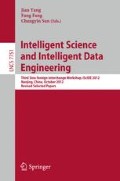Abstract
Large number of applications involving multiple views of data are coming into use, e.g., reporting news on the Internet by both text and video, identifying a person by both fingerprints and face images, etc. Meanwhile, labeling these data needs expensive efforts and thus most data are left unlabeled in many applications. Co-training can exploit the information of unlabeled data in multi-view scenarios. However, the assumptions of co-training, i.e., sufficient and redundant are so strong to be held in most situations. It is notable that different views often have different discrimination ability, while views with strong discrimination ability are usually hard to be obtained. As a consequence, it is a promising way to exploit unlabeled multi-view training data to integrate the information of the strong view into the weak view so that the weak view’s discrimination ability can get improved. Only classifiers trained on the weak view will be used to do the classification tasks afterwards. In this paper, based on dependence maximization, we propose a framework to inject the information of strong views into weak ones. Experiments show that the framework outperforms co-training in improving the performances of classifiers trained on the weak view.
Access this chapter
Tax calculation will be finalised at checkout
Purchases are for personal use only
Preview
Unable to display preview. Download preview PDF.
References
Chapelle, O., Schölkopf, B., Zien, A.: Semi–Supervised Learning. MIT Press, Cambridge (2006)
Blum, A., Mitchell, T.: Combining labeled and unlabeled data with co–training. In: Proceedings of the 11th Annual Conference on Computational Learning Theory, Madison, WI, pp. 92–100 (1998)
Abney, S.: Bootstrapping. In: Proceedings of the 40th Annual Meeting of the Association for Computational Linguistics, Philadelphia, PA, pp. 360–367 (2002)
Balcan, M.F., Blum, A., Yang, K.: Co-training and expansion: Towards bridging theory and practice. In: Saul, L., Weiss, Y., Bottou, L. (eds.) Advances in Neural Information Processing Systems 17, pp. 88–96. MIT Press, Cambridge (2004)
Roli, F., Didaci, L., Marcialis, G.L.: Template Co-update in Multimodal Biometric Systems. In: Lee, S.-W., Li, S.Z. (eds.) ICB 2007. LNCS, vol. 4642, pp. 1194–1202. Springer, Heidelberg (2007)
Roli, F., Didaci, L., Marcialis, G.L.: Adaptive biometric systems that can improve with use. In: Ratha, N., Govindaraju, V. (eds.) Advances in Biometrics: Sensors, Systems and Algorithms, vol. 3, pp. 447–471. Springer, Heidelberg (2008)
Zhou, Z.-H., Zhan, D.-C., Yang, Q.: Semi-supervised learning with very few labeled training examples. In: Proceedings of the 22nd AAAI Conference on Artificial Intelligence, Vancouver, Canada, pp. 675–680 (2007)
Jolliffe, I.T.: Principal Component Analysis. Springer, New York (1986)
Tenenbaum, J.B., Desilva, V., Langford, J.C.: A global geometric framework for nonlinear dimensionality reduction. Science 290(5500), 2319–2323 (2000)
Comon, P.: Independent component analysis-A new concept? Signal Processing 36(3), 287–314 (1994)
He, X., Niyogi, P.: Locality Preserving Projections. In: Sebastian, T., Saul, L., Schölkopf, B. (eds.) Advances in Neural Information Processing Systems 16, Vancouver, Canada, pp. 153–160 (2003)
Roweis, S.T., Saul, L.: Nonlinear dimensionality reduction by locally linear embedding. Science 290(5500), 2323–2326 (2000)
Fisher, R.: The use of multiple measurements in taxonomic problems. Annals of Eugenics 7(2), 179–188 (1936)
Wold, H.: Partial least squares. Encyclopedia of the Statistical Sciences 6, 581–591 (1985)
Hardoon, D., Szedmak, S., Taylor, J.: Canonical correlation analysis: An overview with application to learning methods. Neural Computing 16(12), 2639–2664 (2004)
Gretton, A., Bousquet, O., Smola, A.J., Schölkopf, B.: Measuring Statistical Dependence with Hilbert-Schmidt Norms. In: Jain, S., Simon, H.U., Tomita, E. (eds.) ALT 2005. LNCS (LNAI), vol. 3734, pp. 63–77. Springer, Heidelberg (2005)
Kushmerick, N.: Learning to remove internet advertisements. In: Proceedings of the 3rd Annual Conference on Autonomous Agents, Seattle, WA, pp. 175–181 (1999)
Craven, M., DiPasquo, D., Freitag, D., McCallm, A., Mitchell, T., Nigam, K., Slattery, S.: Learning to extract symbolic knowledge from the world wide web. In: Proceedings of 15th National Conference on Artificial Intelligence, Madison, WI, USA, pp. 509–516 (1998)
Joachims, T.: A probabilistic analysis of the Rocchio algorithm with TFIDF for text categorization. Computer Science Technical Report CMU-CS-96-118. Carnegie Mellon University (1996)
Author information
Authors and Affiliations
Editor information
Editors and Affiliations
Rights and permissions
Copyright information
© 2013 Springer-Verlag Berlin Heidelberg
About this paper
Cite this paper
Zhang, Q., Zhan, DC., Yin, Y. (2013). Learning with Weak Views Based on Dependence Maximization Dimensionality Reduction. In: Yang, J., Fang, F., Sun, C. (eds) Intelligent Science and Intelligent Data Engineering. IScIDE 2012. Lecture Notes in Computer Science, vol 7751. Springer, Berlin, Heidelberg. https://doi.org/10.1007/978-3-642-36669-7_68
Download citation
DOI: https://doi.org/10.1007/978-3-642-36669-7_68
Publisher Name: Springer, Berlin, Heidelberg
Print ISBN: 978-3-642-36668-0
Online ISBN: 978-3-642-36669-7
eBook Packages: Computer ScienceComputer Science (R0)

